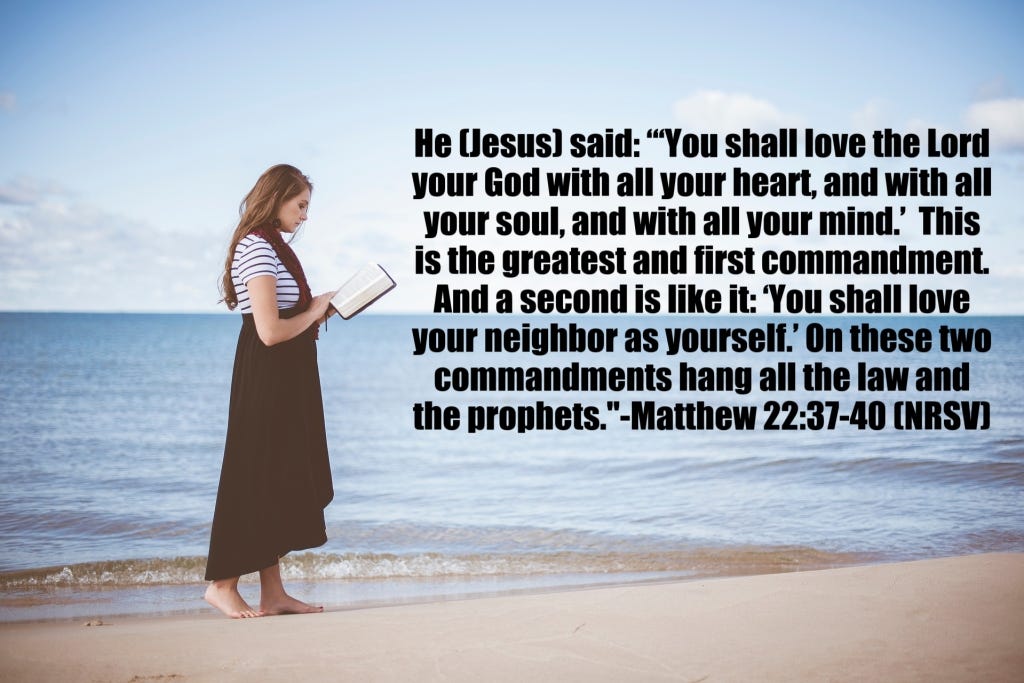Day 13: Obeying the Greatest Commandments
#RethinkChurch is doing a 22-day journey for self-reflection based on John Wesley’s 22 questions. I composing short blog posts addressing each question. I am using these posts to encourage Christians, especially Progressive and Mainline Christians to reflect deeply on what it means to be Church in a world marred by oppression and violence.
Day 13: Do I disobey God in anything?
I snickered reading this question, because well, of course I have. Chances are you have as well. In my opinion, the much more interesting question would be, “in what ways have you disobeyed God” and then start listing them. Trying to discuss just one of the many ways I have disobeyed God is like throwing a container of rainbow glitter on the ground and trying to pick up only the red glitter, it’s a difficult if not impossible task. So instead of trying to list all of the many ways I disobey God on a daily basis, I am going to focus on systematic disobedience. (Is that even a phrase? Probably not.)
I define "systematic disobedience" as acts that we not only commit on an individual basis, but also on a societal level. This form of disobedience is prevalent in every institution from the government to academia and it is something that Christians across the theological spectrum and from each denomination struggles with: affirming the dignity of other human beings, particularly the marginalized.
I know I sound like a broken record: so many of my blog posts seem to be saying the same thing in different ways: as Christians we are called to advocate for the subjugated. For me, this calling is central to our identity as Christians. Some Christians focus on believing the “correct thing” about God and the Bible such as Biblical inerrancy or a specific depiction of God. To be honest, I’m not interested in that version of Christianity. I do not find the idea of providing someone with a long list of theological beliefs and stating, “you need to believe this or face eternal punishment" a worthwhile use of my time. That image of God does not appeal to me.
Instead, I firmly believe that the only form of Christianity worth following is one that demands that we treat ourselves and other people, especially the vulnerable as beloved children of God. I believe that this is one of the most important demands God makes of us and also one of the hardest to fulfil for a variety of reasons.
Affirming the dignity and worth of every person, including the marginalized means that those of us with any measure of power need to be willing to relinquish it. In a society that values power, wealth, and the status, affirming the dignity of each person often means advocating for policies that may work against our own individual interests while aiding the majority of people.
Affirming the dignity of each person means pushing back against the status quo, which often provides a sense of comfort and stability. It means being considered an outcast or even a threat. Those who advocate for radical change are often pushed out of institutions that seek gradual change at the expense of the most vulnerable. It means speaking out when being quiet is much safer or comfortable.
To be frank, it’s easy to affirm a list of theological beliefs. In the United States, a still predominantly Christian country, it is easy to be a Christian. Despite the fear-based narratives that are pushed by some people, Christianity is not under attack in the United States. Affirming the dignity and worth of non-Christians, is not an act of persecution. It is easy, in the United States to say, “I am a Christian,” it is much harder is to live out a Christianity that values each and every person and that advocates for the marginalized.
American Christianity is tied with empire and power, as a result claiming Christianity, especially a form that endorses the predominant values of capitalism, white supremacy, and nationalism does not require much effort. But that form of Christianity requires constantly disobeying God. It requires calling God a liar. God says welcome the stranger? Only if they are rich and white. God demands that we take care of the poor? Nah, let’s create an economic system that rewards the rich and that leaves the poor to fend for themselves.
Want to obey God? Then take seriously commands to love others and to advocate for the disenfranchised.
Day 1: Illusions of Perfection
Day 2: The Dangers of Embellishment
Day 3: Loose Lips Sink Ships or Silence Kills?
Day 5: The Oppression of Professionalism
Day 6: Mental Illness and Distorted Thinking
Day 8: Making Sense of the Bible
Day 9: Praying to Cosmic Santa Clause
Day 10: The Importance of Talking…and Listening



